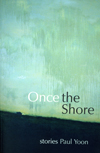Once the Shore
The wind. The East China Sea. Time gnawing on the shore. In the eight assured short stories in his first collection, Yoon takes us through fifty years on the fictional Korean island of Solla, where his characters map out lives eroded by warfare and polished by a series of tender passing moments.
The wind. The East China Sea. Time gnawing on the shore. In the eight assured short stories in his first collection, Yoon takes us through fifty years on the fictional Korean island of Solla, where his characters map out lives eroded by warfare and polished by a series of tender passing moments.
Literally and metaphorically, Yoon’s characters are true islanders, separated from one another both in body and spirit by deep seas. They seem intent on learning how to swim, and if not that, at least how to drown well. Sinaru, a young boy in the story “So That They Do Not Hear Us,” pleads for “a room filled with water.” He is fascinated with the neighbor woman, an old diver he thinks is otherworldly enough to save him from a life of being bullied. The diver can’t wrest him from life’s wreckage, but she can give him a bathtub for his wounds. She muses about the sea: “if you were in it without purpose, there was the sense of going nowhere and being nothing, the sense of insignificance. And that each descent and surfacing was a struggle against this.”
Yoon’s other characters doggedly struggle against this insignificance. Even those whose lives have already been blighted soldier on with resolution and elegant dignity. A quietly warring couple motor out to fish their blown-up son from the sea. A crippled girl tries to protect an American deserter. Another girl struggles to keep the farm where her mother left her. A responsible daughter tries to explain her love for the vagrant thieving boy she has grown up with, who has returned to the island: “He traveled great distances. He started fires . . . And I thought it beautiful. And loved him.”
It’s this measured doggedness that embeds these stories in the mind, as well as Yoon’s ability to fit the physicality and soul of an entire life into a single paragraph. For example, a woman argues with her husband, then mourns her son:
Afterward, she lay in the corner of the bedroom and pressed the side of her face against the wall and said, “Karo, I am listening to your heart. I am listening to the sea. And I am scared.” Bey was across the room, looking up at the thatched roof that seemed to spread until he saw a vast network of hands extending. Karo’s hands were thick and scarred and calloused from the nets, from the war, and they were always cold and always beautiful.
These stories are about big emotions – big betrayals, lasting attachments, deepening disappointments. They’re about the way we fail each other, but also about the little graces we give each other to keep one another going. They’re, simply, about us. Yoon knows us.
And by now you’ve gotten a spoonful of his beautifully calibrated prose. Even when the stories seem momentarily becalmed, his descriptions keep the writing wonderfully rich. The sentences themselves remain generally simple and spare, but resonate fully. A man’s beard smells like “citrus and the river.” Another one’s fingernails taste like flour.
These details, like little hooks, grab us and pull us completely into a character’s interior life. They pull us to the end of the book, and back to the beginning again. Dip your toes in. Wade out. Dive in.





